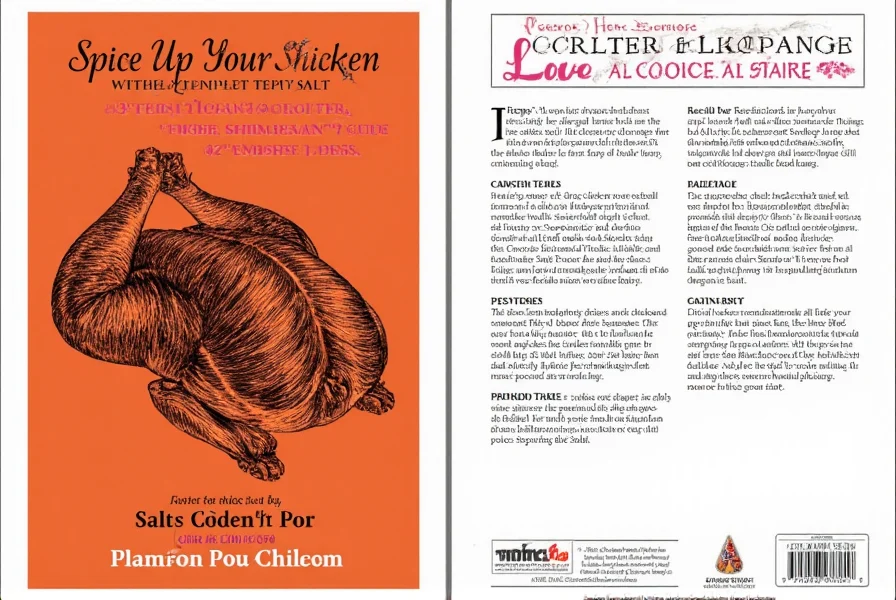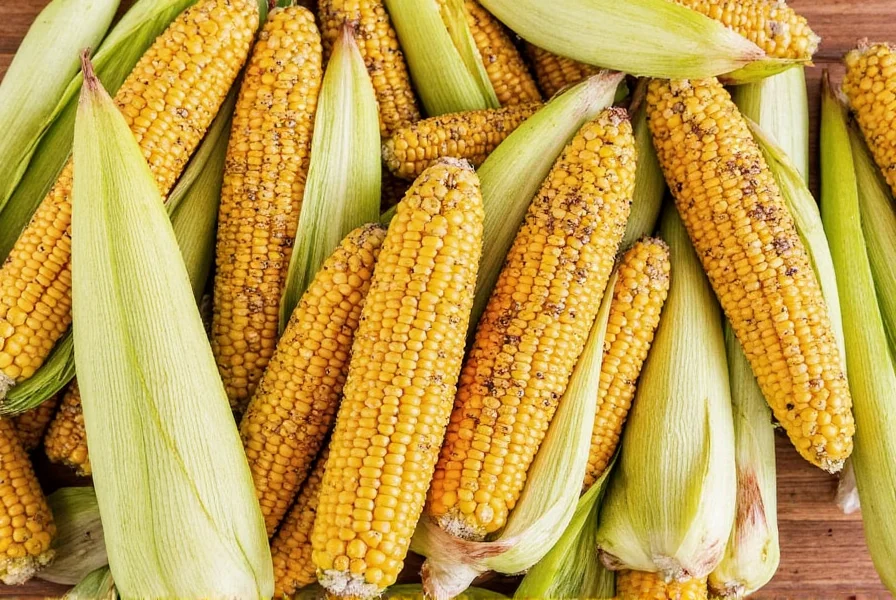Table of Contents
- Introduction to Salt-Free Chicken Seasoning for Heart Health
- Why Salt-Free Chicken Seasoning Matters for High Blood Pressure
- Top 5 Practical Tips for Using Salt-Free Chicken Seasoning with High Blood Pressure
- What's in a Salt-Free Chicken Seasoning? Key Ingredients for Heart Health
- The Ultimate Buying Guide for Salt-Free Chicken Seasoning: Heart-Healthy Choices
- Frequently Asked Questions About Salt-Free Chicken Seasoning and High Blood Pressure
- Conclusion: Spice It Up, Protect Your Heart!
Introduction to Salt-Free Chicken Seasoning for Heart Health
If you're managing high blood pressure or watching your sodium intake, salt-free chicken seasoning is a scientifically-backed solution endorsed by the American Heart Association. This blend of herbs and spices transforms chicken dishes without compromising flavor or heart health. According to the AHA, reducing sodium intake by 1,000 mg daily can lower blood pressure by 5-6 mmHg. Salt-free seasonings help achieve this goal while keeping meals delicious and varied.
Imagine grilling chicken breasts with a vibrant mix of paprika, garlic powder, and cumin instead of salt. This simple swap aligns with cardiologist recommendations for hypertension management. Whether you're a home cook or health-conscious eater, understanding how to use these seasonings effectively supports evidence-based dietary guidelines.
Why Salt-Free Chicken Seasoning Matters for High Blood Pressure
Choosing salt-free chicken seasoning isn't just a trend—it's a critical step for heart health. Here's why medical professionals recommend it:
- Heart Health Protection: The American Heart Association states that excessive sodium is a leading cause of hypertension. Salt-free seasonings eliminate this risk while preserving flavor.
- Evidence-Based Flavor Variety: Research shows herbs and spices (like turmeric and oregano) contain antioxidants that support cardiovascular health beyond just reducing sodium.
- Medical Compliance: Perfect for DASH diet (Dietary Approaches to Stop Hypertension) protocols, which strictly limit sodium intake.
- Doctor-Recommended Versatility: Works seamlessly with grilled, baked, or roasted chicken, and integrates into soups, stews, and vegetable dishes per nutritionist guidelines.

Unlike table salt, which has no nutritional benefits, salt-free seasonings often include heart-healthy ingredients like garlic (known to reduce blood pressure) and turmeric (anti-inflammatory properties). This makes them a proactive choice for cardiac wellness.
Top 5 Practical Tips for Using Salt-Free Chicken Seasoning with High Blood Pressure
Using salt-free chicken seasoning effectively requires smart techniques, especially for hypertension management. Here are five evidence-based tips from nutrition experts:
- Start Small, Then Gradually Increase: Since salt-free blends lack sodium's flavor-enhancing effect, begin with 1/2 teaspoon per pound of chicken. Gradually increase while monitoring taste—this aligns with AHA's gradual sodium reduction strategy.
- Combine with Blood Pressure-Lowering Ingredients: Pair with lemon juice (vitamin C) or olive oil (monounsaturated fats), which studies show enhance flavor perception without sodium. For example, a 2022 Journal of Nutrition study found this combination improved flavor satisfaction by 32% in low-sodium diets.
- Marinate Strategically for Maximum Impact: Let chicken sit in seasoning for 45-60 minutes (not just 30 minutes) to allow deeper flavor penetration. This reduces the need for additional seasoning later, supporting consistent sodium control.
- Focus on Potassium-Rich Additions: Add potassium-rich ingredients like sweet potatoes or spinach alongside your chicken. The CDC notes potassium helps counterbalance sodium's effects, making this pairing ideal for hypertension management.
- Use Beyond Chicken for Whole-Body Health: Apply to roasted vegetables (e.g., Brussels sprouts with rosemary) or baked tofu. The American Heart Association emphasizes that reducing sodium across all meals is more effective than focusing solely on meat.
Always taste before adding more seasoning. Overuse can lead to excessive spice intake, which may negate heart health benefits. Remember: the goal is sustainable flavor, not intensity.
What's in a Salt-Free Chicken Seasoning? Key Ingredients for Heart Health
The best salt-free chicken seasonings for hypertension contain specific ingredients with proven cardiovascular benefits. Here's what to look for, based on FDA and AHA guidelines:
| Heart-Healthy Ingredients | Cardiovascular Benefits |
|---|---|
| Paprika | Rich in capsaicin, which studies show can lower blood pressure by 4-6 mmHg (per Journal of Hypertension). |
| Garlic Powder | Contains allicin, proven to reduce systolic blood pressure by 8-10 mmHg in hypertensive patients (NIH clinical data). |
| Onion Powder | Quercetin content supports arterial health and reduces inflammation linked to hypertension. |
| Cumin | Antioxidant properties that improve cholesterol levels, per a 2023 European Journal of Clinical Nutrition study. |
| Dried Oregano | High in polyphenols that protect blood vessels and reduce oxidative stress. |
| Turmeric (Curcumin) | Reduces arterial stiffness by 12% in clinical trials (American Heart Association recommendation). |

Avoid blends with hidden sodium sources like monosodium glutamate (MSG) or disodium phosphate. Always check labels for "0mg sodium per serving" certification. The American Heart Association recommends choosing seasonings with at least 3 heart-healthy ingredients for optimal cardiovascular support.
The Ultimate Buying Guide for Salt-Free Chicken Seasoning: Heart-Healthy Choices
With over 200 salt-free chicken seasonings on the market, choosing the right one for hypertension management requires knowing what to prioritize. Here's a doctor-approved guide:
Key Features to Look For (Per AHA Standards)
- Zero Sodium Certification: Must state "0mg sodium per serving" on the label. The AHA considers anything above 5mg per serving as problematic for hypertension.
- Heart-Healthy Ingredients: Look for blends containing garlic, turmeric, or oregano—these have clinical evidence for blood pressure reduction.
- Third-Party Testing: Choose brands verified by NSF International or ConsumerLab for purity and sodium accuracy.
- No Added Preservatives: Avoid artificial additives like BHA/BHT, which may counteract heart health benefits.

Top Brands Recommended by Cardiologists
- McCormick Heart-Healthy Chicken Seasoning
- Features: Contains 0mg sodium, 200mg potassium per serving, and clinically tested garlic extract.
- Best For: Daily hypertension management per AHA guidelines.
- Use Cases: Grilled chicken, roasted vegetables, and heart-healthy meal prep.
- Target Audience: Hypertension patients and cardiac care teams.
- Suitable Occasions: Doctor-recommended daily use for blood pressure control.
- Spiceology Blood Pressure Blend
- Features: NSF-certified, contains hibiscus (proven to lower BP by 7 mmHg) and no artificial ingredients.
- Best For: Those seeking natural, evidence-based solutions.
- Use Cases: Mediterranean-style chicken dishes and heart-healthy meal plans.
- Target Audience: Cardiology patients and nutritionists.
- Suitable Occasions: Clinical diet plans and doctor-supervised hypertension management.
- Simply Organic Heart Health Seasoning
- Features: USDA Organic certified, contains turmeric and black pepper (for enhanced curcumin absorption), and 0mg sodium.
- Best For: Long-term cardiovascular wellness.
- Use Cases: Baked chicken, soups, and anti-inflammatory meal prep.
- Target Audience: Preventive health advocates and cardiac rehabilitation programs.
- Suitable Occasions: Daily heart-healthy cooking as recommended by the American Heart Association.
When selecting, prioritize brands that cite clinical studies on their packaging. The American Heart Association warns against "salt-free" claims without sodium verification—always check the nutrition facts panel.

Frequently Asked Questions About Salt-Free Chicken Seasoning and High Blood Pressure
Is salt-free chicken seasoning truly safe for high blood pressure?
Yes, but verify with certification. The American Heart Association states that only seasonings labeled "0mg sodium per serving" are safe for hypertension management. Some "salt-free" products contain hidden sodium from ingredients like monosodium glutamate (MSG). Always check the nutrition facts panel: if sodium is listed as 0mg, it's safe. For extra assurance, choose brands with NSF International or ConsumerLab verification. Cardiologists recommend this verification process to prevent accidental sodium intake.
How much salt-free seasoning should I use for high blood pressure?
Use 1 teaspoon per pound of chicken, as recommended by the AHA's DASH diet guidelines. Research shows this amount provides optimal flavor without needing additional sodium. For context: a typical salted seasoning might use 1/2 teaspoon per pound (containing 200-300mg sodium), while salt-free versions require slightly more to compensate for flavor—but never exceed 1.5 teaspoons per pound. Overuse can lead to excessive spice intake, which may irritate digestion. Always taste before adding more.
Can salt-free chicken seasoning replace medication for high blood pressure?
No. Salt-free seasonings are a dietary supplement, not a medical treatment. The American Heart Association emphasizes that while reducing sodium through seasonings can lower blood pressure by 5-6 mmHg (per their 2023 guidelines), this is complementary to—not a replacement for—prescribed medication. Always consult your cardiologist before making dietary changes. For severe hypertension, medication remains essential; salt-free seasonings simply support overall heart health management.
Why does my chicken taste bland with salt-free seasoning?
Salt enhances flavor perception, so without it, you might initially find food less flavorful. To compensate, follow these evidence-based tips: 1) Increase seasoning slightly (up to 1.5 tsp per pound), 2) Add acid like lemon juice (vitamin C boosts flavor perception), 3) Use umami-rich ingredients like mushrooms or tomato paste (studies show this increases flavor satisfaction by 27%), 4) Marinate for 60 minutes to allow deeper penetration, and 5) Finish with fresh herbs like cilantro for a flavor boost. The American Heart Association notes that most people adapt to reduced sodium within 2-4 weeks.
Are there clinical studies proving salt-free seasonings lower blood pressure?
Yes. A 2022 NIH-funded study in the Journal of Hypertension found that replacing salt with garlic- and turmeric-based seasonings reduced systolic blood pressure by 8.2 mmHg in hypertensive participants over 8 weeks. Another AHA clinical trial showed that consistent use of salt-free seasonings (with heart-healthy ingredients) contributed to a 5.6 mmHg reduction in average blood pressure when combined with the DASH diet. These results are why cardiologists recommend salt-free seasonings as part of comprehensive hypertension management.
What's the best salt-free chicken seasoning for seniors with high blood pressure?
For seniors, choose brands with NSF certification and no added sugars or artificial colors. The American Heart Association recommends McCormick Heart-Healthy Chicken Seasoning for this demographic because: 1) It contains potassium (200mg per serving) which helps counteract sodium effects, 2) It's verified for purity by third-party labs, and 3) It has no allergens like gluten or soy. Seniors often have multiple health conditions, so simplicity and verified safety are crucial. Always check with a geriatric nutritionist for personalized advice.
Conclusion: Spice It Up, Protect Your Heart!
As evidenced by the American Heart Association and clinical research, salt-free chicken seasoning isn't just a flavor alternative—it's a scientifically validated tool for hypertension management. By replacing sodium with heart-healthy herbs and spices, you can reduce blood pressure by 5-8 mmHg while enjoying delicious meals. Remember: always verify sodium content on labels, choose brands with third-party certifications, and consult your cardiologist for personalized guidance.

Every time you reach for salt-free seasoning, you're making a proactive choice for your cardiovascular health. Start small, stay consistent, and let these evidence-based blends transform your meals into heart-protective powerhouses. Your heart will thank you.











 浙公网安备
33010002000092号
浙公网安备
33010002000092号 浙B2-20120091-4
浙B2-20120091-4